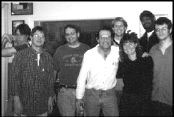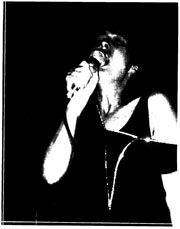NORTH MISSISSIPPI ALLSTARS (WITH OYSTERHEAD)
Paramount, 682-1414, $27.75 7:30 p.m. Sun., Oct. 21
LUTHER DICKINSON knows it wasn’t an actual ghoul he heard wailin’ a few years back on Highway 51 in Hernando, Miss. But that doesn’t mean the sound—which inspired the title track on the North Mississippi Allstars’ new album, 51 Phantom—wasn’t just a little creepy.
“One day I was driving down the road, and I heard a disembodied voice, man,” says the Allstars’ 28-year-old singer/ guitarist as the band drives their van across the Georgia state line on the way to a gig. “Somebody had a guitar and a mike, and they were talkin’ shit and singin’ blues and playin’ guitar. . . . I couldn’t find where he was coming from. He was like the great undiscovered Fat Possum [Records] artist.”
Plenty of folks consider Dickinson’s group, with his brother Cody on drums and high-school pal Chris Chew on bass, the great young hope for the blues. The band doesn’t showboat, but they aren’t afraid to work their instruments, either; they’re rooted in the music’s rich history without being slave to it.
Shake Hands With Shorty (2000), the band’s Grammy-nominated debut, stirred elements of hip-hop, gospel, and hippie jamming into a brew based on tunes by the hill-country bluesmen from whom the Dickinsons learned firsthand, such as R.L. Burnside and Junior Kimbrough, along with older folk like Fred McDowell.
“51 Phantom” and other original tracks on the new disc send the band into avowed rock territory. The tune’s namesake highway is a pre-interstate artery running north-south along the east side of Mississippi. The more famous Highway 61 runs through the blues’ delta home to the west. But the Allstars, like Burnside and Kimbrough, come from hill country, where they wrap their blues not in 12-bar packages but in extended, hypnotic rhythms.
“The song kind of turned into a tribute, almost, to R.L. and Junior and Otha Turner,” Dickinson says. “[and] all the bootlegging, guitar slinging, juke-joint-party-throwin’ bad mothafuckas down here.”
The Allstars may be young, but they’ve been steeped in all this music. That’s because they had the good fortune to be born to producer/musician Jim Dickinson. Among his zillion credits, Dickinson the elder played keyboards on the Rolling Stones’ Sticky Fingers and Bob Dylan’s Time out of Mind, and manned the boards for the Replacements’ Pleased to Meet Me and Big Star’s Third. He also produced 51 Phantom.
Having your pop cut your recording is a blessed curse. “In a way, it’s insufferable, but in another way, as he says, ‘Production is ongoing,'” says Luther.
Father Dickinson is forever pushing to capture things at the conceptual—rather than polished—stage, his son says. One of 51 Phantom‘s first takes, the crunchy obsession tune “Snakes in My Bushes,” would appear to be a straight-up rocker but actually envelops the Allstars’ affinity for a wide berth of sounds. The track’s melody is fixed in the ancient blues “Rollin’ and Tumblin’,” a Roland 808 joins Cody on the beats, and the guitar solo would surely strike a chord with Angus Young.
Then there’s “Ship,” a joy-filled number that sounds like something Duane Allman must hear when he kneels down at those great pews in the sky. While 51 Phantom leans hard on the rock distortion pedals, gospel’s been an increasing focus of the band.
Luther and Cody don’t hit the altar each Sunday, but they did grow up listening to country gospel artists such as the Stanley Brothers. Chew thumped the bass at Rising Sun Baptist Church.
The band found they shared an interest with keyboardist John Medeski (of Medeski, Martin and Wood) in the African-American “sacred steel” style of talking slide-guitar playing. Last fall they joined up with sacred steel guitarist Robert Randolph, christened themselves the Word, and released a self-titled instrumental gospel album in July.
Along with traditional holy songs such as “Keep Your Lamp Trimmed and Burning,” The Word includes originals like the funk-fattened “Waiting on My Wings.” The band plans a West Coast tour in early 2002.
“It’s still a weird thing, playing gospel music in a club—even instrumental,” Luther Dickinson says. “There’s such a heavy stigma that you can’t escape. It’s a personal thing that we feel. It’s an old balance. All those old blues guys would play gospel in church and then play blues on the weekends. It’s a very interesting dichotomy in music that’s been around forever.”








